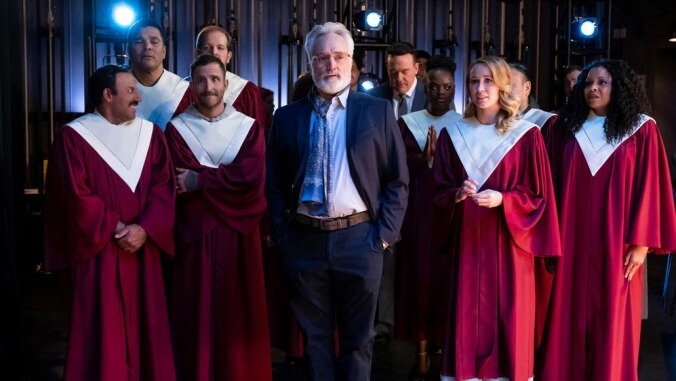Perfect Harmony’s ensemble needs to get in tune

NBC is losing two notable sitcoms next year: The critically acclaimed The Good Place and nostalgic favorite Will & Grace both wrap up in 2020, leaving a certain void in the network’s slate for warm, entertaining, and sharp comedies. It’s only natural to look at its new fall entries, including the Bradley Whitford-led musical sitcom Perfect Harmony, as possibly worthy replacements. This feel-good church-choir comedy seems like a perfect fit for the peacock network on paper, but based on the pilot, it doesn’t have the necessary mellifluence just yet.
Perfect Harmony is essentially an unorthodox workplace comedy, which fits in well with previous NBC hits like 30 Rock, Parks And Recreation, The Office, and even the recently acquired Brooklyn Nine-Nine. Of course, all of those now-beloved series took a little time post-pilot to find their footing, which means there’s room for Perfect Harmony to improve upon its mediocre opener. For now, it relies too strongly on Emmy winner Whitford’s star power, despite an ensemble that includes Pitch Perfect’s Anna Camp and Rizwan Manji, the latter of whom has established his brand of niche humor in Schitt’s Creek and The Magicians. It’s clear that Whitford’s gruff performance alone can’t prop up an entire series, but like the disgruntled, redeemable protagonist he plays (whose qualities often recall Ted Danson’s Michael in The Good Place), his presence does offer some hope for the group and show.
The pilot opens with Arthur Cochrane (Whitford) sitting in his car near a church, mourning the death of his wife in her small hometown in Kentucky and contemplating his own will to live. That’s when he hears a discordant choir attempting to sing “Hallelujah” and decides that no, this will absolutely not be the last sound he hears. He barges into their session and quickly starts to correct their voices, just presuming he has the right to do so. As Princeton’s former music department chair, he kind of has a point, but Arthur’s rigid methods also what caused the student revolt (in the form of formal complaints) that ended with his resignation. This first scene alone sets up the rough-around-the-edges characterization the show has in mind for Arthur: He doesn’t talk so much as critique, targeting everything from their posture to accents. To really drive the point home, Arthur also gives them clichéd nicknames (Tymberlee Hill’s Adams is Whitney Houston because they’re both Black, Will Greenberg’s Southern dimwit Wayne is dubbed Matthew McConaughsnake for his tattoos).
This middling choir is led by Ginny (Camp), who is nothing less than a walking ray of sunshine; rather than yell at her son for saying “B-word,” she grins and praises him for controlling his cussing, confirming she’s a cool mom and a sweetheart. Ginny convinces Arthur to stay on and help the choir train for an annual singing competition, which they lose every year to another church that’s led by a man Arthur despises (and who might be his late wife’s ex). That’s reason enough for Arthur, who decides to let revenge motivate him, and the training commences. But the ornery man can’t help himself, and his blunt personality clashes with the rest of the choir’s immense Southern hospitality and politeness. Perfect Harmony repeatedly tries to underscore the juxtaposition between Arthur and the rest of the characters; his resentful state is matched only by Ginny’s optimism or Reverend Jax’s (Manji) constant grinning. But the conflict is superficial early on; Perfect Harmony’s mismatched comedy consists mainly of the visual contrast between Arthur’s grumpy demeanor and everyone else’s sunny exteriors.
Naturally, the blustering eventually Arthur oversteps by involving himself in Ginny and Wayne’s impending divorce, and he’s shown the door. That’s when Perfect Harmony’s other issue becomes quickly transparent: boy, is this show predictable. About halfway into the episode, you start visualizing how it’s going to end and that’s never a good sign. Arthur is soon welcomed back, and on the day of the competition (yes, we get to it in the first episode itself), the choir takes the stage and surprises him by singing a bizarre mashup of “Hallelujah” and Survivor’s “Eye of the Tiger,” a song whose personal importance he had previously shared with Jax. It’s your standard feel-good moment, but the rushed pacing of the episode diminishes its impact. We know Arthur and the choir are going to find a way to work together—it’s the premise of the show—but the pilot doesn’t convince you of why this genial group of Southerners so readily welcomes a grumpy old stranger into their lives and works this hard to keep him there.
Lesley Lake Webster, who created Perfect Harmony, is also responsible for blessing our screens with comedic gems like Speechless and Life in Pieces, so she’s familiar with executing sitcom tropes with a certain degree of wackiness and compassion. These qualities aren’t quite evident in the opening episode but that doesn’t mean they won’t show up. The pilot isn’t a complete miss: There are a few one-liners and jokes that work, like Ginny’s description of Princeton (“they never made the Final Four but outside of basketball, it’s actually a pretty good school”). Camp, a South Carolina native, shines the brightest in the pilot, providing a good foil to Whitford’s abrasiveness, but there isn’t as much cohesion in the broader group. Arthur’s reasons for sticking around the town, not to mention the town’s unquestioning acceptance of him, remain unclear by the end of the pilot. If Perfect Harmony really wants to follow in the footsteps of The Good Place or even Will & Grace, it needs to find the beat—and quickly.